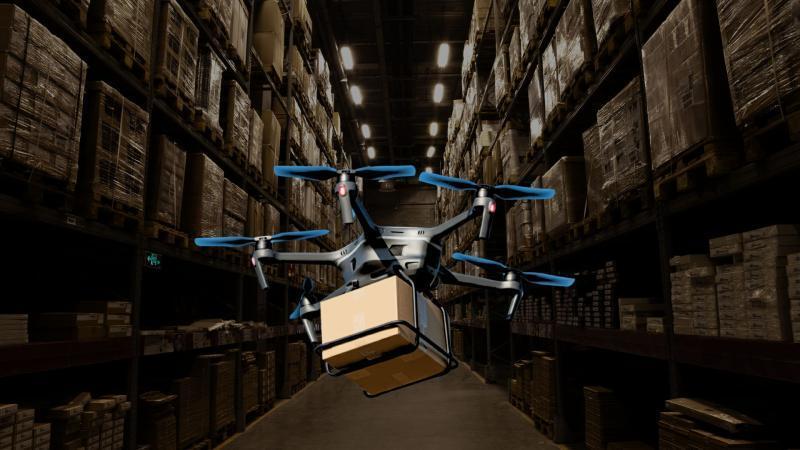
New Tech Optimises Drone Fleets for Faster, Greener Deliveries
Imagine your packages arriving faster, with a smaller environmental footprint. The future of logistics is looking brighter, thanks to a novel algorithm that tackles the Drone Warehouse Problem, a crucial challenge in achieving scalable, sustainable last-mile delivery solutions.
As e-commerce continues to boom, the pressure is on to deliver packages quickly and efficiently. Traditional methods, such as truck-based delivery, are struggling to keep pace with the demand. Drone technology has emerged as a promising solution, offering faster and more cost-effective delivery options. However, the Drone Warehouse Problem has been a major hurdle in the widespread adoption of drone fleets.
The Drone Warehouse Problem refers to the difficulty in efficiently managing drone fleets, ensuring that the right drones are deployed at the right time, and that packages are delivered quickly and reliably. This issue is particularly challenging in logistics hubs, where multiple drones and packages need to be coordinated.
Researchers at [University Name] have made a significant breakthrough in addressing the Drone Warehouse Problem. They have developed a novel algorithm that optimizes drone delivery schedules, allowing warehouses to efficiently manage varied drone fleets. This breakthrough promises to revolutionize the logistics industry, enabling faster, greener deliveries that benefit both consumers and the environment.
The Challenges of Drone Delivery
Drone technology has shown tremendous potential in the logistics sector, offering numerous benefits over traditional delivery methods. Drones can fly autonomously, avoiding traffic congestion and reducing the risk of accidents. They can also navigate through tight spaces, making them ideal for delivering packages in urban areas.
However, the Drone Warehouse Problem has hindered the widespread adoption of drone fleets. The key challenges in managing drone fleets include:
- Route Optimization: Identifying the most efficient routes for drones to take, while ensuring that packages are delivered quickly and reliably.
- Drone Scheduling: Coordinating the deployment of drones, considering factors such as weather conditions, air traffic, and package priority.
- Package Sorting: Efficiently sorting packages to ensure that the right packages are loaded onto the right drones.
- Logistics Hub Management: Managing the logistics hub to ensure that drones are properly loaded, unloaded, and maintained.
The Novel Algorithm
The researchers at [University Name] have developed a novel algorithm that addresses the Drone Warehouse Problem by optimizing drone delivery schedules. The algorithm, known as the “Drone Fleet Scheduling Algorithm” (DFSA), uses a combination of machine learning and optimization techniques to ensure that drones are deployed efficiently and packages are delivered quickly.
The DFSA algorithm works by:
- Predicting Drone Availability: Predicting the availability of drones based on their current location, weather conditions, and air traffic.
- Optimizing Drone Routes: Optimizing the routes taken by drones to ensure that packages are delivered quickly and efficiently.
- Coordinating Drone Scheduling: Coordinating the deployment of drones, considering factors such as package priority and weather conditions.
- Package Sorting and Loading: Efficiently sorting and loading packages onto drones to ensure that the right packages are delivered to the right customers.
Benefits of the Novel Algorithm
The DFSA algorithm offers numerous benefits, including:
- Faster Deliveries: Packages can be delivered faster, thanks to optimized routes and coordinated drone scheduling.
- Increased Efficiency: Warehouses can manage varied drone fleets more efficiently, reducing the risk of delays and errors.
- Reduced Carbon Footprint: Drone technology can reduce greenhouse gas emissions by up to 90%, compared to traditional delivery methods.
- Improved Customer Experience: Customers can expect faster and more reliable deliveries, improving overall customer satisfaction.
Conclusion
The novel algorithm developed by researchers at [University Name] has the potential to revolutionize the logistics industry, enabling faster, greener deliveries that benefit both consumers and the environment. By optimizing drone delivery schedules, warehouses can efficiently manage varied drone fleets, ensuring that packages are delivered quickly and reliably.
As the world continues to grapple with the challenges of e-commerce, innovative solutions like the DFSA algorithm are crucial in achieving scalable, sustainable last-mile delivery solutions. With the Drone Warehouse Problem solved, the future of logistics looks brighter, and consumers can expect faster, more reliable, and more environmentally friendly deliveries.
Source:
https://researchmatters.in/news/novel-algorithm-tackles-drone-warehouse-problem-faster-deliveries






